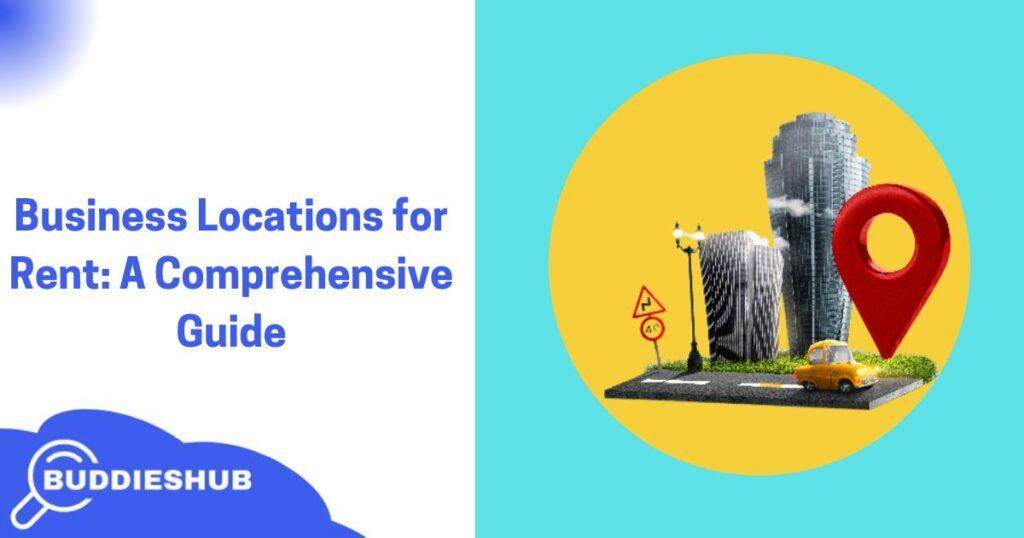When starting or expanding a business, one of the most crucial decisions you’ll make is selecting the right business location. A good location can significantly impact your operations, customer reach, and overall success. This article will explore the key factors to consider when renting a business location, types of business spaces available, and tips for choosing the best place for your business.
Types of Business Locations for Rent
There are several types of business spaces available for rent, each catering to different needs and industries. Understanding the options can help you make a more informed decision.
Office Space
Office spaces are commonly rented by businesses that require a professional environment for operations. This includes industries like finance, consulting, technology, and legal services. Office spaces can be either shared (co-working spaces) or private (individual offices).
- Co-working Spaces: These are shared office spaces where businesses, freelancers, and entrepreneurs can rent desks or office suites. Co-working spaces offer flexibility and cost-efficiency. Many come with amenities like high-speed internet, meeting rooms, and communal kitchens.
- Private Office: These spaces are entirely yours, offering more privacy and control. They are ideal for larger companies or businesses that need dedicated office space.
Retail Space
Retail space is designed for businesses that sell goods or services directly to customers. The location and visibility of retail spaces are often critical to attracting foot traffic and increasing sales.
- Street-Level Stores: These locations are typically found in high-traffic areas, such as main streets or shopping districts. They provide visibility but may come with higher rent.
- Shopping Malls: Renting space in a shopping mall provides access to established foot traffic. However, costs may vary depending on the location within the mall and the type of business.
Industrial Space
If your business involves manufacturing, storage, or distribution, industrial space might be the right choice. These locations are usually larger and come equipped with facilities like loading docks and high ceilings to accommodate machinery and inventory.
- Warehouses: Ideal for businesses that need storage or shipping capabilities, warehouses are large, open spaces that can be customized to fit various operations.
- Manufacturing Facilities: These spaces are designed for production processes, often with specialized equipment and infrastructure.
Retail and Office Hybrid
Some businesses, like restaurants or gyms, require both office and retail space. These hybrid locations allow you to operate your business while providing services to customers on-site.
Factors to Consider When Renting a Business Location
Selecting the right location for your business goes beyond just the type of space. Several factors can influence your decision:
Location and Accessibility
- Foot Traffic and Visibility: If you’re opening a retail store or service business, high visibility and foot traffic can play a critical role in attracting customers. Locations near popular streets, public transport hubs, or commercial areas are usually ideal.
- Accessibility for Employees and Clients: Consider how easy it will be for both employees and customers to reach your business. Proximity to major roads, parking availability, and public transport options can impact convenience for both parties.
Size and Layout
- Space Requirements: Before you start looking at business locations for rent, assess the size your business needs. Consider the number of employees, the type of equipment or products, and the nature of the work. Choose a space that meets your immediate needs but also allows for future growth.
- Layout and Design: The layout of the space should match the needs of your business operations. For instance, a retail store should have an open floor plan, while an office might need separate meeting rooms or workstations.
Cost and Lease Terms
- Rent and Operating Costs: Rent is a significant ongoing cost, and it’s important to make sure that the rental price fits within your budget. Also, inquire about additional costs such as utilities, maintenance, and property taxes.
- Lease Agreement: Carefully review the lease agreement, especially the terms regarding rent increases, duration, and exit clauses. It’s essential to negotiate terms that align with your business plan and growth projections.
Zoning and Regulations
Each area has specific zoning laws that determine what kind of business can operate there. Ensure the space you’re considering is zoned appropriately for your industry. For example, you might not be able to open a restaurant in an area zoned for office use.
How to Find Business Locations for Rent
Finding the perfect location can be time-consuming, but with the right approach, you can streamline the process.
Real Estate Listings
Real estate websites and rental platforms are great resources for finding business locations for rent. Websites like LoopNet, Zillow, and local real estate agencies provide detailed listings with photos, rental prices, and descriptions of available properties.
Commercial Real Estate Brokers
Hiring a commercial real estate broker can be beneficial, especially if you’re unfamiliar with the local market. A broker can help you find spaces that meet your specific needs, negotiate terms, and navigate the lease process.
Networking and Word of Mouth
Sometimes, the best rental opportunities come through personal connections. If you’re operating in a specific industry or area, attending local business events, joining industry groups, and networking with other entrepreneurs can lead to valuable recommendations.
Benefits of Renting a Business Location
There are several advantages to renting a business location instead of buying one, especially for startups or businesses that are still growing:
Lower Initial Costs
Renting typically requires less upfront capital than purchasing a property. You’ll only need to pay a security deposit and the first month’s rent rather than a large down payment.
Flexibility
Leasing a business location offers more flexibility, especially for businesses that may need to relocate as they grow or adapt to market conditions. Unlike owning property, renting allows you to adjust your business size or location based on changing needs.
Access to Prime Locations
Renting allows businesses to occupy high-demand areas that might otherwise be unaffordable for purchase. This is particularly important for retail businesses that rely on customer traffic and visibility.
How to Negotiate Your Lease
Negotiating your lease terms is crucial to securing the best deal. Here are some tips to help:
Understand Market Rates
Before entering negotiations, research the market rates for similar business spaces in the area. This will give you a better idea of what is reasonable for rent and other costs.
Negotiate Rent Increases
Ensure that the lease includes a clear understanding of how rent increases will be handled. Try to negotiate fixed-rate increases instead of open-ended increases tied to inflation.
Examine Lease Duration
Shorter leases offer more flexibility, but longer leases may provide more stability and often come with better terms. Consider the growth potential of your business when determining the duration.
Conclusion
Renting a business location is an essential part of building a successful business. By understanding the different types of rental spaces, considering key factors such as location, size, cost, and lease terms, and using the right strategies to find and negotiate the best space, you can set your business up for success. Take the time to choose wisely, as the right location can help you build a strong foundation for your business’s growth and profitability.



